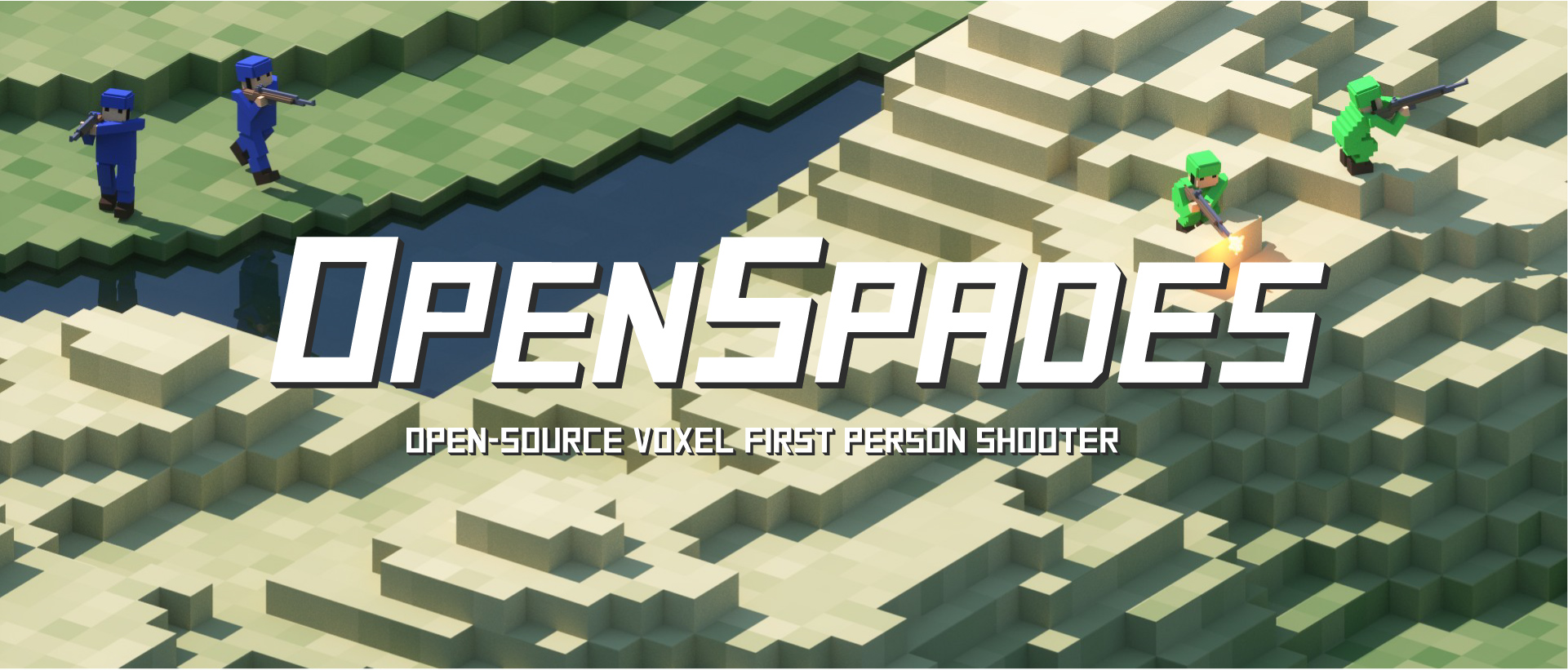Official website — Download — Community — Trello board
OpenSpades is a compatible client of Ace of Spades 0.75.
- Can connect to a vanilla/pyspades/pysnip server.
- Uses OpenGL/AL for better experience.
- Open source, and cross platform.
Before you start: In case you're having issues to build OpenSpades, it may be because this README file is outdated, if so:
- See the Building Guide, which may be up to date
- Or open an issue if the problem persists
On snap enabled systems, the latest pre-built stable release of OpenSpades can be installed with:
sudo snap install openspadesOnce installed, you'll be able to launch OpenSpades from inside the desktop menu or from your terminal with the openspades
On flatpak enabled systems, OpenSpades can be installed with:
flatpak install flathub jp.yvt.OpenSpadesOnce installed, you'll be able to launch OpenSpades from inside the desktop menu or from your terminal with flatpak run jp.yvt.OpenSpades
GCC 4.9 / Clang 3.2 or later is recommended because OpenSpades relies on C++11 features heavily.
-
Install dependencies:
On Debian-derived distributions:
sudo apt-get install pkg-config libglew-dev libcurl3-openssl-dev libsdl2-dev \ libsdl2-image-dev libalut-dev xdg-utils libfreetype6-dev libopus-dev \ libopusfile-dev cmake imagemagick(because of a bug in some distributions, you might also have to install more packages by
sudo apt-get install libjpeg-dev libxinerama-dev libxft-dev)On other distributions: Install corresponding packages from your repository (or compile from source).
-
Clone OpenSpades repository:
git clone https://github.com/yvt/openspades.git && cd openspades
-
Create directory
openspades.mkin cloned/downloaded openspades repo and compile:mkdir openspades.mk cd openspades.mk cmake .. -DCMAKE_BUILD_TYPE=RelWithDebInfo && make
-
Install OpenSpades (optional but recommended):
sudo make installnote: If you have a previous installation of OpenSpades, you have to uninstall it manually by
sudo rm -rf /usr/local/share/games/openspadesbefore installing a new one. -
Launch:
openspades(if installed) orcd $REPO_DIRECTORY/openspades.mk; bin/OpenSpadesand enjoy
- Get the required software if you haven't already:
- CMake 2.8+
- PowerShell 5.0
- Integrated with Windows 10.
- Older versions are not tested, but might work
- Visual Studio 2017
- VS2015 is also supported, but VS2017 is more recommended
- VS2013 is no longer supported, but might work
- Grab the source code:
- Stable version: https://github.com/yvt/openspades/releases
- Latest development version (0.1.x): https://github.com/yvt/openspades/archive/master.zip
- Extract or checkout the source
- All examples will assume
E:/Projects/openspades, update paths in the examples to reflect yours
- Get (pre-compiled) copies of glew, curl, sdl2 and zlib, and place them in
E:/Projects/openspades/Sources/Externals
- See the file
E:/Projects/openspades/Sources/Externals/readme.txtfor details and links to pre-compiled sets of libraries for your version of Visual Studio
- Run CMake:
- Source:
E:/Projects/openspades - Binaries:
E:/Projects/openspades/OpenSpades.msvc - Generator:
- For VS2017:
Visual Studio 15 (2017)(not Win64!) - For VS2015:
Visual Studio 14 (2015)(not Win64!)
- For VS2017:
- Open
E:/Projects/openspades/OpenSpades.msvc/OpenSpades.slnin Visual Studio. - Build the solution.
- The recommended build configuration is
MinSizeRelorReleaseif you're not an developer - The default build output directory is
E:/projects/OpenSpades/OpenSpades.msvc/bin/BUILD_TYPE/
- Copy all
.dllfiles fromSource/Externals/libto the build output directory. - To get audio working, download a Windows release of OpenSpades, extract it, and copy the following dlls to the build output directory:
- For OpenAL audio:
openal32.dll - For YSR audio:
YSRSpades.dll,libgcc_s_dw2-1.dll,libstdc++-6.dll,pthreadGC2.dll
- Download the Non-free pak, extract it, and copy
Nonfree/pak000-Nonfree.pakto theResourcesfolder inside your build output directory, which is probablyE:/Projects/openspades/openspades.msvc/bin/BUILD_TYPE/Resources. You can also copy the paks contained inOfficial Mods/folder of OpenSpades 0.0.12b to add more fonts and improve localization support of your build. - Copy
Resources/PackageInfo.jsonto theResourcesfolder inside your build output directory.
- Get the latest version of Xcode and OpenSpades source.
- Get (pre-compiled) copies of libraries, and place them in
Sources/Externals
- See the file
Sources/Externals/readme.txtfor details
- Download macOS release of OpenSpades, show the package contents, and copy
libysrspades.dylibtoSources/Externals/lib. - Download and extract the Non-free pak. After that, copy
Nonfree/pak000-Nonfree.pakandfont-unifont.paktoResources/. - Open
OpenSpades.xcodeprojand build.
For troubleshooting and common problems see TROUBLESHOOTING.
Please see the file named LICENSE.



